|
Enter content here
Rrustem "Remi" Mustafa, left, former senior commander of Kosovo rebels, speaks with the Commander of the Kosovo Protection Corps, Agim Ceku, during a ceremony for the anniversary of NATO troops entering Kosovo in Pristina in this June 11, 2000 file photo. Mustafa, an ethnic Albanian, was arrested in the provincial capital, Pristina, in an operation led by U.N. police, Sunday Aug. 11, 2002 for allegedly torturing and murdering at least five captives, officials said. (AP Photo/Visar Kryeziu, File)
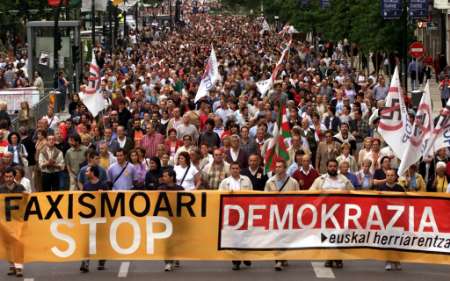 Thousands of supporters of Basque separatist party Batasuna take part in a dmonstration in San Sebastian on August 11, 2002. Supporters of the party staged a rally on Sunday to protest against the Spanish government's moves to ban it. Otegi headed a march through the Basque resort of San Sebastian, behind a banner which read in Spanish and the Basque language: "Stop fascism. Freedom for the Basque country!" Batasuna is a party which shares the same separatist goal as ETA but denies links to the armed group. REUTERS/Pablo Sanchez
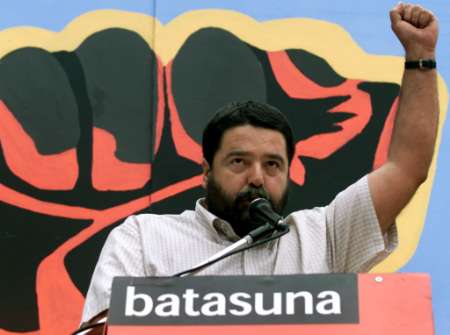 Joseba Alvarez, spokesman for the Basque separatist party Batasuna, speaks during a demonstration in San Sebastian August 11, 2002. Supporters of the party staged a rally on Sunday to protest against the Spanish government's moves to ban it. Otegi headed a march through the Basque resort of San Sebastian, behind a banner which read in Spanish and the Basque language: "Stop fascism. Freedom for the Basque country!" Batasuna is a party which shares the same separatist goal as ETA but denies links to the armed group. REUTERS/Pablo Sanchez
22-year-old Dobromir Kourdomanov from Silistra, currently unemployed, won the game 'Catch the Piglet'. The show is part of the Danubian Feast that started in the town of Silistra. They were resumed after a 12-year break. 34 dare-devils swam the 2-km distance between Romanian and Bulgarian banks. The eldest participant in the marathon was 70 years old. Five women competed with men. Photo BTA
SITUATION IN CRISIS REGIONS.
MIA
Increased intensity of gunshots has been heard Sunday night in Tetovo region.
The biggest number of shootouts have been registered from the Teke, Gorna Carsija, Kupenik, Sipad, Drenovec-2 and Ciglana settlements, the area around the medical centre, "Kuzman Josifovski-Pitu" barracks, the city stadium, the area around the reservoirs of waterworks, Stipska street opposite to the building of the police, "Mosa Pijade" school, the SEE University and the railway station.
Interior Department says volleys of gunshots and sporadic shootouts have been registered from Odri, Dobroste, Otusiste, Prsovce, Tearce, Neprosteno, Slatino, Dzepciste, Poroj, Mala Recica, Tenovo, Radiovce, Celopek, Palatica, Trebos, Ozormiste, Zelino, Zerovjane, Gajre, Selce and other villages.
Police says shootouts have not been aimed at direct targets.
The public order and peace have been violated seven times with sporadic shootouts and volleys of gunfire Sunday in Kumanovo - Lipkovo region.
Police sources say gunshots came from the villages of Matejce, Ropajce, Vistica and Slupcane and have been aimed at undefined targets.
DEDICATION OF RESTORED ST. KLIMENT'S AND ST. PANTELEJMON'S CHURCH AT PLAOSNIK.
MIA
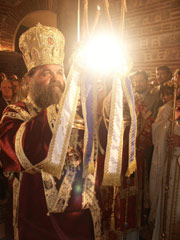
The dedication of the restored St. Kliment's and St. Pantelejmon's church ended in Ohrid Sunday with a holy archpriest liturgy, headed by his Holiness Pontiff of the Macedonian Orthodox Church Archbishop of Ohrid and Macedonia Stefan, along with the members of the Holy Archpriest Synod and numerous priests.
The highest state officials, along with a large number of citizens attended the act of dedication.
The holy liturgy was preceded by the signing of the charter that contained all significant data on the restoration of the centre of the Slavic spirituality and its setting in the central part of the altar, along with the remains of St. Kliment.
MOC Pontiff Stefan and the Synod members expressed their gratitude to the Macedonian Prime Minister Ljubco Georgievski, who was most deserving for the restoration of St. Kliment's church. Afterwards, Georgievski lit the eternal icon lamp of the church.
"Macedonian truth and justice will shine and triumph from St. Kliment's church in Plaosnik," Metropolitan of Debar and Kicevo Timotej said in his address at Sunday's gathering regarding the dedication and the first holy liturgy at St. Kliment's church.
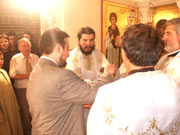
Stressing that "the constant awaken self-consciousness by blessing and support of St. Kliment, resulted in creation of Macedonian state and the Orthodox Church," Timotej said, "the sanctification of St. Kliment church also sanctifies our souls and bodies."
"First monastery in Plaosnik, founded by St. Kliment, was the holy place and the real Slavic university for many centuries, and rays of educated pupils of the immortal teacher had sparkled from this holy centre, who inspires us even today for national and church self-consciousness. St. Kliment remained a living light and people see the sun in him, who illuminated the path to earthly and heavenly kingdom," the Metropolitan Timotej stressed.
Chairman of the Board for restoration of St. Kliment's church Academic Krum Tomovski stressed the importance of restoration of the church, stating that it was build for spiritual and cultural needs of the people.
The realisation of the project included scientific and professional approach, and archaeological priceless values have been found during the excavation process.
"This is an impressive effort of our constructors from Macedonia and from the village of Pustec, Albania, who restored St. Kliment church in 16 months, with which Macedonian people have repaid to the saint for his great work," Tomovski said.
St. Kliment's church, which has been restored on the foundations of the ancient St. Kliment's church, which had been destroyed in the 15th century and a mosque built at its place, is a imposing object with a 236m2 space, as well as an altar on 27m2 space.
The naos and the narthex take up over 96m2, the paraclists 20m2, the south porch 27m2, while the bell tower 50m2.
The height of the object is analogous to the proportions of the objects that were built in St. Kliment's time. A marble iconostasis has been set, along with an authentic St. Kliment's grave, which contains the remains of the great Slavic educator, teacher, protector and patron.
The restoration of the church began in April 2001, with use of building material that was authentic with the one of 10 centuries ago, such as semi-processed stone, brick and hot welded mortar. The roof has been made out of old-fashioned bricks. Special attention was dedicated to the floors, which have been made in mosaic out of marble.
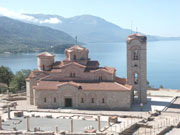
A wonderful space, which was and is again the centre of Slavic spirituality, has been revealed. This only confirms that St. Kliment's church was not only the first Slavic University, first script house, but also the first healing place for the people, which is seen through the fact that St. Kliment dedicated the expanded church to St. Pantelejmon, who was not only a spiritual an, but also a folk doctor.
After 530 years, the remains of the greatest Slavic educator St. Kliment were brought to the church that St. Kliment dedicated to St. Pantelejmon on Saturday evening.
A prayer was held in church St. Bogorodica (Holy Mother of God), attended by Archbishop of Ohrid and Macedonia Stefan, members of the Holy Synod, numerous priests and monks.
Afterwards, the remains of St. Kliment, carried in a special sarcophagus by Metropolitans Timotej and Agatangel, were brought to his church at Plaosnik, where he had been buried in 916.
In his address, MOC Pontiff Stefan asked for forgiveness due "to our inability or maybe someone's refusal to bring St. Kliment in his eternal dwelling place, which he chose by himself".
"But now you are in your home again", Stefan stated.
"St. Kliment is a proof that there is no weaponry nor force that can fight against holy things. Could the place where St. Kliment walked on, built, created, learned and taught not be holy. Plaosnik is our spiritual height, our dream, and St. Kliment is our second St. Paul", MOC Pontiff said.
Afterwards, the first evening religious service was held in the church of St. Pantelejmon and St. Kliment.
PONTIFF STEFAN: ST. KLIMENT'S CHURCH IS THE SUPPORT OF THE MACEDONIAN EXISTENCE.
MIA
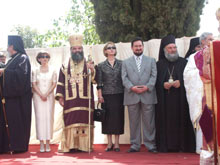
"Plaosnik is St. Kliment's home and the foundation of our holy church, St. Kliment's resting place, but also hope and support of our sacred church and our existence", Pontiff of the Macedonian Orthodox Church Archbishop of Ohrid and Macedonia Stefan emphasised in his address after the dedication of the restored St. Kliment's and St. Pantelejmon's church Sunday.
"After five centuries, Plaosnik continues to live, with its grandiosity and all its spiritual greatness", Stefan stated, emphasising that the ones that destroyed the church at Plaosnik "either knew or were well taught what were they supposed to do, when destroying the great sanctity of this people and this country, but what God gave us will live forever and win throughout the time".
"How should one speak before our greatest orator, the most convincing preacher, before the one that gave us all beauty of our word, who does not only know about God, but lives with him, who not only built churches, but created one. One feels excitement and admiration speaking before him, while the soul and the voice tremble. How should one speak of an educator like St. Kliment, the Ohrid miracle maker? His work speaks best, his sanctity, his continual martyrdom. His martyrdom was not only the destruction of his church, but the desecration of his grave, and the splitting up of his remains on three arts like his homeland. Hos sacred work and our country were split, leaving most of the educator's prayers in the sarcophagus here and in his sacred monastery in Ohrid, while the other part in Sofia, as well as in monastery St. Jovan Prodrom near Lerija", Stefan stated.
Martyrdom is, he added, "the destruction of the Lesok monastery and other objects, as well as the victims that died in the defense of out country and our religion. St. Kliment's martyrdom is also our bad relation towards him, towards his church and our religion".
"St. Kliment surely suffers from our problems in the Synod, our non-unity in Australia, our misunderstandings in USA and our division among ourselves.
How can St. Kliment not suffer when he sees the danger to our country and our people?", MOC Pontiff asked and emphasised, "he also suffers because of our division as people and non-unity, especially in these exceptionally hard times, in which the existence of the Macedonian state and MOC has been endangered".
Therefore, Stefan called upon "the necessary Macedonian reconciliation and unity, because St. Kliment asks this, our sacred church wants this, and our people expect this".
"Who has the right to forget the state, church of people's interests due to personal, party or other interests? What should happen in order to understand that we are our own enemies, and that history repeats itself? This people, this country, this church suffer mostly from its people, and that is why St. Kliment should pray to put some reason in us and understand the time and dangers that stalk us", Stefan stated.
As he stated, the restoration of St. Kliment's church, was reached thanks to the faith and respect towards St. Kliment, as well as the exceptional assistance and efforts of the Macedonian Government, especially Prime Minister Ljubco Georgievski, the Ministry of Culture, the Chairman of the Board for restoration of the monastery, the engagement of the authorised archpriest Metropolitan Timotej, the employees in the Ohrid Bureau and Museum, the project manager and the contractors, as well as the diligent hands of the masters Macedonians from Prespa, Albania.
Emphasising that this work brought back the forgotten glory of St. Kliment's monastery, MOC Pontiff stated that with God's help and the prayers of St. Kliment we would also have to restore St. Kliment's University at Plaosnik with all its contents, not forgetting "that the restoration of work by the Ohrid miracle maker means the building of our own spiritual and national restoration".
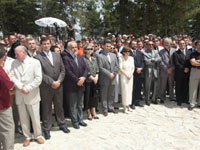
"Educators, teachers and leaders belong to those peoples that know how to value, respect and preserve their work. Long live this day and the restored monastery", Archbishop of Ohrid and Macedonia Stefan stated in his address.
According to the decision of the MOC Holy Archpriest Synod, Prime Minister Ljubco Georgievski was given the highest dedication of St. Kliment of Ohrid.
Minister of Culture Ganka Samoilovska-Cvetanova and the Chairman of the Board for restoration of St. Kliment's monastery at Plaosnik Academic Krum Tomovski were given secondary dedications of St. Kliment of Ohrid. Such dedications of third order were also given to the first rector of the Macedonian orthodox seminary "St. Kliment of Ohrid" in Skopje, professor Boris Boskovski, director of the Bureau for protection of cultural monuments and Museum from Ohrid Pasko Kuzman, the author of the project for restoration of St. Kliment's monastery Tanja Paskali Puntasevska, as well as priests Klime Manevski and Gjorgji Nikolovski, who participated in the church folk gatherings for restoration of the Ohrid Archbishopric in the Macedonian Orthodox Church.
The MOC Holy Archpriest Synod also gave a cross to priest Todi Jovanij from Pogradec, Albania for his contribution in the building and the nurturing of the good relations between MOC and the Albanian Orthodox Church, while Todor Paskali and Pero Mitanovski were given notes of praise for their contribution in the building.
After the ceremony, the director of the Bureau for protection of cultural monuments and Museum from Ohrid Pasko Kuzman gave the key of St. Kliment's restored church to Metropolitan of Debar and Kicevo Timotej, as well as the monument with the image of St. Kliment of Ohrid, as a sign of permanent and sacred perseverance and realisation of the mission of this object, which is another beauty and greatness on Macedonian soil.
PM GEORGIEVSKI RECEIVES HIGHEST DECORATION OF ST. KLIMENT OF OHRID.
MIA
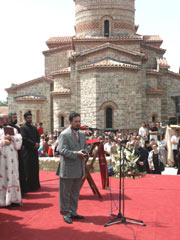
In his address at the gathering after the dedication of the church, Macedonian Prime Minister and Chairman of the Board for support of the restoration of monastery church "St. Pantelejmon" at Plaosnik Ljubco Georgievski stated that the restored church "is not only a foundation in the ground, but the most beautiful church in Macedonia and the Balkans".
Reminding that when the foundation of the church was set on December 8, 2000, there was nothing but empty space, Prime Minister Georgievski stated "at that time, we set out in search of the thing we talked about for decades, but did not want to see it before us".
"St. Kliment's church is the first Slavic University. In a search for the St. Kliment's church, we found Byzantium, Justinian, the late Roman Empire, antique Macedonia, as well as all historic layers that had passed and remained", Macedonian Prime Minister emphasised.
He promised that the archeologists would continue with the excavations of the space around St. Kliment's church starting from Monday.
"In 15 days, the construction that is behind you will be covered, with the opening of more beautiful mosaics of a new early Christian basilica. The space up until the Samoil fortress will be archeologically researched in a short time, and presented before the Macedonian citizens and the world, who will be able to see this common beauty", Georgievski stressed.
He stated that with the opening of this space "many things became clearer from a historic point of view".
"Why the name Ohrid Archbishopric had been always accompanied by the title 'Justiniana Prima' as the largest after the one in Constantinople? This very square and the mosaics explain many historic enigmas", Georgievski stated.
Regarding the the dilemma "why did St. Kliment come in the most remote place in the former Byzantium Empire", Georgievski said, "We see that he came in the most sacred place after Constantinople. The vastness of this space enhances the largeness of St. Kliment too, the man, the educator, the saint, who came here in the 9th century in order to win and become the first Slavic bishop".
He emphasised that the value of the archeological findings and the restored church were common cultural heritage of all people, including the ones of other religions.
Reminding that all dignified peoples wanted to build something great in a spiritual sense, Prime Minister Georgievski pointed out the idea of Solomon and his father David to build the largest church of God- the Solomon Church, or the idea of Justinian for building of an even larger church in Constantinople- church "St. Sofia", which exists even today.
"We did not set out with the ambition to build something that would be the largest in the world, but to restore St. Kliment's church. I believe that our archeologists and architects did just that. That is why we have to thank St. Kliment once again for giving us this opportunity. The Bible teaches us that will is not enough, but that one needs 'something to be given to him'", Georgievski emphasised.
That is why, he added, "we should be happy as a generation of Macedonian citizens to be blessed by God, who gave us the opportunity to build and restore the church that was Macedonia's dream for centuries".
According to Georgievski, in these difficult times "the gratitude towards God and the prayer are our essential necessity".
"I believe that next year we will witness new miracles, at which we will marvel very soon", Macedonian Prime Minister stated.
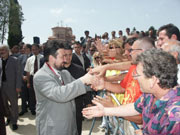
In accordance with the decision of the MOC Holy Archpriest Synod, which was passed at the regular session on August 7, MOC Pontiff Stefan gave Prime Minister Georgievski the "Decoration of St. Kliment of Ohrid".
Expressing his gratitude for the decoration, Macedonian Prime Minister emphasised that he was "convinced that the empty space, which existed in the spiritual area in our country in the past 50 years, has ended once and for all times", and that "from now on, we will live in St. Kliment's spirit and give many presents and surprises to all true believers".
August 11 in History.
Standartnews
In 1877 the battles near Mount Shipka come to end. The Turkish troops retreat.
We Watch Fairy Play of Falling Stars.
Standartnews
The Perseids, a spectacular meteoric shower, approaches the Earth. It'll reach our planet on the night of August 12. There'll be a rainfall of sparkling stars in the sky. If there are no clouds, the falling meteors will be visible in Bulgaria with naked eye. The moon will be in shadow and won't spoil the spectacle, astronomers explained. The falling stars are parts of a comet, which every year in August passes by the Earth. Its light brightens the sky. The cosmic parts enter the atmosphere at a speed of about 60 km/sec and burn.
Thousands Wept for Vanga.
Standartnews
Vladimir Simeonov

Thousands of people gathered in Rupite locality near Petrich yesterday to commemorate famous clairvoyant Vanga. Today it will be six years since she died. The memorial liturgy was served yesterday, though. Priests from Petric served it in "St. Petka" church. People from all over Bulgaria attended the liturgy. Those who were close to Aunt Vanga, among them painter Svetlin Roussev, came to pay homage to her. Among the grieving were mayors of Petrich, Sandanski and Blagoevgrad and NMS deputy Snezhina Grozdilova.
BULGARIA-NATO.
BTA
US Senate Expert Haltzel Gets Convinced Bulgaria Seeks NATO Membership.
Varna (on the northern Black Sea coast), August 11 (BTA) - US Senate expert Dr Michael Haltzel described as very useful the talks he had with Bulgarian deputy Defence Minister Ivo Ivanov and Chief of General Staff of the Bulgarian Army Gen. Nikolai Kolev. The meeting was attended by US Ambassador to Bulgaria James Pardew.
Dr Haltzel said that now it is absolutely clear to him that Bulgaria really seeks to join NATO, adding NATO will take this fact into account in the next months.
Dr Haltzel is advisor to US Senator Joseph R. Biden, who chairs the Senate Foreign Relations Committee, Staff Director of the Subcommittee on European Affairs of the Committee, and lead Democratic Senate staffer on NATO and Balkan Policy.
He had two-hour talks at the Higher Naval School in Varna which focused on the reform in the Bulgarian army and Bulgaria's progress in the implementation of the NATO Membership Action Plan.
Ambassador Pardew said after the meeting that Dr Haltzel had the possibility to get first-hand knowledge about the reforms in the Bulgarian army and familiarize himself with the way in which Bulgaria is preparing for accession to NATO. He did not comment a possible extension of the deadline set for the demolition of this country's inventory of missiles but expressed satisfaction with the current situation, as well as his assurance that the demolition would be completed according to schedule.
"We also received positive signals about the activities we have been carrying out," Deputy Defence Minister Ivanov said.
"The meeting with Dr Haltzel is very important because the information he has been delivered can reach Washington and help along the processes which are in the focus of the Bulgarian public's attention at the moment," he added.
This is Dr Haltzel's third visit to Bulgaria in the last eight years.
In his words, a huge progress has been made here both in the civil and the military sphere. He emphasized he is pleased with the fact that the relations between Bulgaria and the United States are very solid.
Later on Chief of Staff Gen. Kolev said that during the discussion of the reform in the Bulgarian army the question of the Bulgarian submarine had also been considered. "We set forth our view that the Bulgarian Naval Force should develop as a system comprising all types of troops that a navy like ours requires, including submarine troops," Gen. Kolev said. Replying the question if the US and NATO demand that the activity of the Bulgarian navy be reduced to coast guard functions, he said that officially no such requirements had been set, and that the discussion of the way in which the navy should develop and improve would go on.
NESSEBUR-PRESIDENT-MEETING.
BTA
President Purvanov Intends to Help Advertise Bulgarian Tourism at Future Meetings with Foreign Statesmen.
Nessebur (the southern Black Sea coast), August 11 (BTA) - Next year President Georgi Purvanov intends to invite a lot of foreign statesmen, business delegations and journalists from countries whose citizens make their holidays in Bulgaria.
Purvanov's statement was made at the end of his meeting with representatives of the tourist industry in Sunny Beach, attended by Deputy Economy Minister Dimiter Hadjinikolov, Interior Ministry Chief Secretary Gen. Boiko Borissov, the regional governors of Varna, Bourgas and Dobrich, mayors of Black Sea municipalities, and chairmen of the councils on tourism.
The problem of tourist advertisement is very important, Purvanov said. He plans to help cope with it by attracting the attention of heads of state and politicians to Bulgaria as a tourist destination during his visits to Russia and Ukraine this autumn.
The meeting in Sunny Beach was organized on Purvanov's initiative. In his view, it was necessary to hold the meeting and discuss the problems of tourism before the appearance of the smooth-reading reports.
Tourism is one of the most important industries that accounts for about 13 per cent of GDP, Purvanov said. The proceeds expected from tourism this year amount to 1,500 million leva.
FOREIGN MINISTER PASSY-UN RESOLUTION-COMMENTARY.
BTA
Bulgaria Has not Any Problems Whatsoever with Arab Countries in Connection with Position on UN Resolution, Foreign Minister Passy Says.
Sofia, August 11 (BTA) Bulgaria has not any problems whatsoever in connection with its abstention on voting a UN resolution in the United Nations General Assembly and the subsequent demarche of Arab ambassadors, Foreign Minister Solomon Passy said on National Radio Sunday.
He recalled that the resolution called for immediate withdrawal of Israeli armed forces from the West Bank. In his words, Bulgaria's relations with the Arab world at the moment were far better than 12 years ago. "They have improved considerably both on the economic and the political plane," Passy said.
He said that preparations were being made to enhance economic relations with Kuwait.
PRIME MINISTER-MEETINGS.
BTA
Prime Minister, Social Policy Minister Discuss Providing Support to Socially Disadvantaged for Heating as from September.
Sofia, August 11 (BTA) - Prime Minister Simeon Saxe-Coburg-Gotha and Labour and Social Policy Minister Lidia Shouleva discussed at a meeting this weekend the possibility of providing support to the socially disadvantaged for heating in advance, commencing from September, the Government Information and Public Relations Directorate said.
At its latest meeting on August 8, the ministers decided that nearly 650,000 households would receive support for heating, starting from November. The project will cost 110.60 ,million leva, 23 per cent more compared to last winter.
Saxe-Coburg-Gotha and Shouleva also discussed the amendments made to the Social Assistance Act Implementing Regulations.
This weekend Saxe-Coburg-Gotha met with Dr Torao Tokuda, a Japanese businessman, in connection with the latter's investment projects in Bulgaria and the construction of a hospital in Sofia.
Saxe-Coburg-Gotha had working meetings with Minister for European Affairs Meglena Kouneva and members of the Council of Ministers.
Debutante Kassova Took Bronze in Munich.
Munich, Georgi Delchev - correspondent of 'Standart' daily
Svetla Dimitrova remained 8th at 100-m hurdles after an injury.
Debutante Yana Kassova won the first medal for Bulgaria at the European track-and-field championship in Munich. 21-year-old Kassova clocked third at 100-m hurdles and took the bronze at her debut at the big championship. Glorie Alozie (Spain) became the champion with 12.73 sec.
Double European champion - Svetla Dimitrova, finished eight in the final in terrible pain. Svetla hit one of the hurdles at the semi-final and hardly managed to finish the race.
Yet, she didn't backtrack from participating in the final, where she ran with dignity and clocked at 13.75 sec, even if she was the last one.
from participating in the final, where she ran with a dignity and clocked at 13.75 sec - though she was the last one.
'Smokie' Prefer Bulgarian Wine.
Standartnews
Albena Atanassova
The rock-singers will sleep in 'Radisson' hotel and perform in the NPC.
The rock-singers from the legendary group 'Smokie' are arriving in Sofia on Tuesday. They will immediately head for Hall No 1 of the NPC, where they will rehearse for their grandiose concert at 8 p.m. in the evening. 'Despite being a world famous stars they aren't at all capricious. They want plenty of mineral water and soda, juices, tea, coffee, and a bottle of wine. We explained to them that no wine can match the Bulgarian one', famous actress Iskra Radeva said. As a matter of fact it was she who invited 'Smokie' twenty years after their first visit. The musicians who sang in Bulgaria for the first time in 1982 will now be accommodated in the 'Radisson' hotel. They'll arrive accompanied by a team of 10 people. "Smokie" return to London on August 14 early in the morning.
Kosovo Police Arrest Ex-Rebel Chief.
AP
PRISTINA, Yugoslavia (AP) - A former senior commander of Kosovo rebels was arrested by U.N. police and NATO ( news - web sites) peacekeepers Sunday for allegedly torturing and murdering at least five captives, officials said.
Rrustem Mustafa, an ethnic Albanian, was arrested in the provincial capital, Pristina, in an operation led by U.N. police, said Wing Cmdr. Drew Andersen, spokesman for the NATO-led peacekeeping force in Kosovo.
Authorities did not disclose the ethnicities of the alleged victims nor the period when the alleged crimes took place.
A United Nations statement only said a suspect was arrested at the request of an international prosecutor.
"The investigation is focused on evidence linking the suspect to the torture and murder of at least five illegally detained persons," the statement said.
Mustafa, also known by his nom de guerre "Remi," was a senior commander of the Kosovo Liberation Army, the rebel force that fought Serb police and the army for independence in 1998-1999. He controlled Kosovo's northern region bordering Serbia.
After the war, Mustafa became a high-ranking official with the Kosovo Protection Corps created to handle civilian emergencies after the U.N. and NATO took control of the province in June 1999. The group consists of former rebels.
Mustafa was suspended from the corps last year after President Bush included him on a list of people viewed as a threat to peace in the western Balkans and a threat to international staff in the region.
Mustafa was among those accused of involvement in the Macedonian insurgency of February 2001.
Bush's executive order, which also named three other corps officials, also banned financial transactions with them.
Mustafa was dismissed in April after breaking the terms of his suspension. At the time, officials would not disclose details of the breach.
Proud Basques defend ancient culture.
BBC
By Daniel Schweimler in Madrid
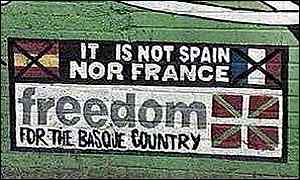
The Basques assert their unique cultural identity.
The Basques have been fighting to protect their language and culture for thousands of years. They are fiercely proud of their history.
They have been occupying their corner of Europe with its lush, green valleys and rugged coastline, since well before Roman times.
No one knows where they came from. Their language, known as Euskera, has no links with any other known language and was spoken long before all of the Indo-European languages in the rest of Europe.
The protection and promotion of Euskera has always been at the heart of the Basque struggle.
Since the return of democracy in Spain following General Franco's death in 1975, Euskera has been thriving.
About 30% of the 2.5 million Basque people speak it and more than 90% of Basque children are now enrolled in Euskera schools.
Radio and television stations broadcast in the language. There are Basque newspapers and a growing number of internationally renowned writers, such as Bernardo Atxaga, whose works have been translated into Castillian Spanish, English, German and French.
Throughout history, Basques have developed a reputation as fierce defenders of their territory - against Romans, Vikings, Visigoths, Muslims and others.
Many invaders have chosen to by-pass the region. When they have managed to put down roots, the Basques have negotiated and learned from them, but have never mixed too much or risked becoming integrated.
From the Middle Ages onwards, they developed a reputation as formidable fishermen and have built boats which have taken them great distances in search of whales and cod.
Sailed with Columbus.
There is some evidence that Basques landed in North America hundreds of years before Christopher Columbus.
It was Basque sailors who made up the bulk of Columbus's crew.
Basque men wear their large berets with pride. It is a hat which was first worn in the Basque region and then exported to France and beyond.
They are are also recognised as the best cooks in Spain for their simple fish dishes and interesting cakes.
In the heart of the Basque country, there are 75 gastronomic societies in the city of San Sebastian alone.
They hold feasts and sometimes march through the streets. These occasions are so important that the mayor is expected to eat at all of them at least once a year.
There is also a rich vein of Basque music and storytelling. Public storytelling sessions are still held in many rural towns and villages.
Loyola - a famous Basque.
Basques have always been known as a fiercely religious people. So it is no surprise that one of the most radical and disciplined religious orders, the Jesuits, was founded by a Basque, Ignatius Loyola, in 1534.
Originally a solider, while recovering from a serious war wound he began reflecting on his life and reading about the saints.
He studied in Paris where he founded the Society of Jesus, or Jesuits.
It had originally been intended as a missionary order. Instead, it went on to spearhead the Counter-Reformation, inspiring respect for its missionary work but fear for its often ruthless defence of its disciplined beliefs.
Fought against Franco.
The Basques had been some of the fiercest opponents of Franco's Nationalist troops during the Spanish Civil War in the 1930s.
One of Franco's most hated opponents, Dolores Ibárruri - known as La Pasionaria or the Passionate One for her inspiring speeches - came from a working-class family in Bilbao.
Picasso immortalised the bombing of the Basque town, Guernika, by Franco's German allies. The painting now hangs in a museum in Madrid.
During Franco's 40-year rule, he punished the region for its opposition. He declared two provinces "traitor provinces."
Franco believed in one, unified Spain and opposed any kind of regional diversification.
He banned the speaking of Euskera in public and ensured that there was little economic investment in the region.
ETA is born.
Franco, like many before him, had found it difficult to suppress this proud nation and the movement for an independent Basque homeland began in the late 1950s.
The separatist group, ETA, began its violent campaign 10 years later.
While support for an independent homeland remains strong, it is by no means overwhelming. Many Basques are happy with the large degree of autonomy they have been granted by the central government in Madrid.
While still a long way from reaching any kind of long term political solution and establishing a permanent peace, it is clear that the Basque language and culture are enjoying a resurgence and that the Basque nation is as strong and vibrant now as it has ever been.
|



